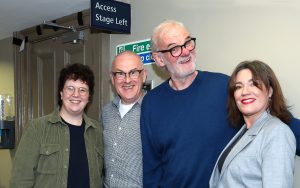Earlier this week, the UK Covid-19 Inquiry started hearing evidence about the impact of the pandemic on children and young people.
Questions were asked of the government in terms of a lack of planning; the lack of consideration on the impact of their decisions on children; the lack of engagement with children and young people; and a one-day planning process for school closures.
Concerns were also raised about the impacts of driving children online, without appropriate safeguards, and how this has contributed to online harms and access to things like violent porn, child criminal and sexual exploitation, and peer-to-peer sexual abuse. The impact of online learning and the widening gap between those with access to devices and support versus children who did not was also highlighted.
In a statement, Northern Ireland Commissioner for Children and Young People, Chris Quinn said the Inquiry was clearly impacted when Monye Anyadike-Danes KC shared powerful messages from children and young people from NI, providing a representative sample of the voices of what those who were vulnerable went through.
Elodie (10 years old at the start of the pandemic) said: ‘Covid impacted so many people. For me, I lost my grandfather as his cancer treatment was stopped due to hospital pressures, and we cared for him at home until he died in July 2020. I was 10… and I remember reading our favourite book to him just before he passed away, one that he had read to me so many times – Guess How Much I Love You by Sam McBratney. I loved him to the moon and back.’
Seren on behalf of Molly (eight years old at the start of the pandemic) said: ‘People often refer to Covid as a period of time, and in the past tense; not the damaging virus that it is. But for families like mine, it continues to be an ongoing risk and has led to inequalities and unnecessary health risks.’
Seren (13 years old at the start of the pandemic) said: ‘The failure of my school to manage the very real risk from Covid and the behaviour of other people, forced me to make the decision to leave school half-way through my A-levels. All of my teenage years have been impacted by the pandemic.’
Nicki (not her real name, 13 years old at the start of the pandemic) said: ‘I feel as though young people were constantly being scapegoated throughout the pandemic and being blamed for spreading the virus, even though many, like me, followed every single rule and made incredible sacrifices.’
Sarah (10 years old at the start of the pandemic) said: ‘The mental health and wellbeing of children had one of the greatest falls during the Covid period. The level of fear the pandemic inflicted onto our generation is rather startling. Young people now are a lot more introverted and seem to avoid going out. This makes perfect sense as when you tell a child that there are germs everywhere and if you get infected you and your family could die, that will leave psychological damage.’
Other core participants outlined that there were and are systemic failures in government in terms of prioritising children’s rights. Many contributors raised the lack of consultations with children’s commissioners as a major flaw, with calls made to place a statutory duty on the government to make it mandatory to consult with commissioners.
Mr Quinn stated: “Throughout day one, we heard consistent and extremely impactful accounts in relation to the systematic erosion of children’s rights, and questions about how we as a society treat children and what we expose them to.
“Calls were also made for the incorporation of United Nations Convention on the Rights of the Child (UNCRC) into domestic law. This is a strategic priority for my office, and I believe that incorporation is the single-most important thing we can do for children and young people – particularly those most vulnerable.
“Through our submissions and evidence provided to the Inquiry, we aim to help children and young people in NI receive meaningful answers and explanations to their questions and, more importantly, to influence the necessary changes and improvements that are needed ahead of the next pandemic. I look forward to giving evidence to the Inquiry on the last day of the public hearings on 23 October 2025.”



